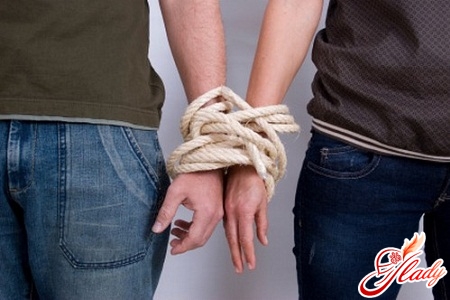 Friendship is one of the greatest gifts of life. This is a wonderful relationship between two people who are close to each other in spirit, care about each other and want each other only the best. True friendship bears honest and faithful relations between friends who understand each other in a way that no one else can understand. In a healthy friendship, both friends feel comfortable. They can always count on mutual support and comfort, they are close and in the best, and at the worst times of their lives. Friends make us happy and laugh, inspire confidence in ourselves and help enrich our life experience. But sometimes the initially healthy friendship is reborn into a depressing relationship, when the emotional dependence of one friend from another appears. Being together is no longer fun, almost every meeting becomes completely depressing. Friendship begins to bring only poisoned fruits.
Friendship is one of the greatest gifts of life. This is a wonderful relationship between two people who are close to each other in spirit, care about each other and want each other only the best. True friendship bears honest and faithful relations between friends who understand each other in a way that no one else can understand. In a healthy friendship, both friends feel comfortable. They can always count on mutual support and comfort, they are close and in the best, and at the worst times of their lives. Friends make us happy and laugh, inspire confidence in ourselves and help enrich our life experience. But sometimes the initially healthy friendship is reborn into a depressing relationship, when the emotional dependence of one friend from another appears. Being together is no longer fun, almost every meeting becomes completely depressing. Friendship begins to bring only poisoned fruits.
How to determine if you have an addiction?
If you feel that something has changed in your relationship with a friend, try to determine what exactly happened. Ask yourself the following questions:
- Despite your help and support, does your girlfriend feel unhappy all the time?
- Do you offer your girlfriend much more help than you get from her?
- When you meet or talk on the phone, your girlfriend always dominates the conversation, talking about her problems?
- Does she show almost no interest in your life or your problems?
- Have you ever noticed that your girlfriend feels much better after she "loads" you with her experiences?
- Do you sometimes have the desire to avoid another meeting with your girlfriend?
- Do you feel trapped by continuing your friendship?
- After every new meeting with your girlfriend, do you feel exhausted?
If most of the questions you answered in the affirmative, then there is an emotional dependence of your girlfriend on you. Let's continue to ask ourselves questions:
- Do you think that for a sense of personal safety and good self-esteem, do you require the constant presence or support of your girlfriend?
- Do you have a sense of loss if you can not be with her?
- Do you demand that the love and sympathy of a friend belong exclusively to you?
- Do you perceive other friends of your girlfriend or even members of her family as your competitors?
- Are you jealous of her?
- You are not able to make any decision or take any action without the approval of a friend?
Then, of course, you are emotionally addicted to your girlfriend.
Characteristics of dependent relationships
Emotionally dependent relationships at first glancemay seem quite harmless, but they can lead to slavish dependence much more than most people can imagine. In order to distinguish between the normal, enriching of both girl friends, the interdependence of unhealthy addiction, we now consider the factors that lead to the latter: how and why emotional dependence on a person begins and how it is maintained. We have already pointed out to you some signs of emotional dependence in friendship. In order to become even clearer what kind of phenomenon it is, we will point out some other signs, the presence of which in the relationship with a friend should alert you. And it should happen, if one of you two:
- He prefers to spend time alone with his girlfriend and is very disappointed if someone or something prevents this;
- Treats a girlfriend's relationship with other people as a threat to your relationship;
- Experiencing irrational anger or depression when a friend is going somewhere;
- Refuses to see the real shortcomings of a friend and takes a defensive position, if you ask about it;
- Constantly shows other people their value for a friend.
And how dependent relationships differ from healthyfriendship? Healthy relationships are free. Friends do not prevent each other from having a circle of interests and communication that would go beyond their friendship. In friendship, we strive to give our girlfriend an impulse to seek new interests and develop new skills. In dependent relationships, all this is impossible, since the existing type of relationship leads only to the restriction of personal growth. In normal relationships, we calmly perceive everything that our friends tell us and do, and our reactions are balanced; when we are emotionally dependent, the girlfriend's occasional remarks can send us to the top of ecstasy or throw us into the abyss of grief. If a close friend leaves us, then it is normal to feel sadness and a sense of loss; for an addicted person this would mean immersion in anguish, panic and despair. A healthy friendship gives joy and creation, dependence brings degradation and slavery. 
Settings for dependence in friendship
Emotional dependence becomesa surprise for most people; they do not see the problem until they come face to face with it. Nevertheless, the dependence does not appear from the vacuum. Certain elements of our personalities and situations can provoke such a course of events. If we know about them, it will allow us to determine when it is necessary to exercise special care in our friendly relations. Who is addicted (personal attitudes)? In general, any person under pressure of circumstances can fall into dependence on another person. Nevertheless, there are several common personality models that are constantly gravitating toward each other to form a dependency. Variations on this topic include:
- Type of relationship "counselor + a person with problems";
- Type of relationship "one who likes to keep everything under control + one who needs direction";
- Type of relationship "parent + child";
- Type of relationship "teacher + student".
Although these pairs also look like a tandem strong andweak, in need of another person, in fact, here are both people - the needy. "Weak" needs help and support, and "strong" has a deep need to be needed. Situational attitudes: when are we most vulnerable? At different times of our lives, each of us is uncertain and ready to grab the saving hand of help. That's when this can happen:
- Crisis situations in life - divorce, death of a loved one, loss of work;
- Transitional periods - the need to adapt to new work, moving to a new home, entering a university, starting a family life;
- The peak of the pressure period is the last week of the session, work at work is a serious illness, a quarrel in the family, big holidays and their eve;
- When we leave the usual situation, where we feel comfortable and safe - a trip to rest, treatment in a sanatorium, participation in a conference, departure on a business trip.
We are also vulnerable when we are bored or indepression. The best way to avoid trouble in the form of getting into dependence at this time is to acknowledge our need for support and plan these needs in advance without going beyond a healthy friendship. The main thing is not to forget that problems start to develop and accumulate when we demand too much support from one person, trying to solve all our problems with it.
Why is it hard to get rid of addiction?
Even when both friends understand that theirthe friendship becomes not quite healthy, they can experience great difficulties in overcoming addiction. Why is this happening? Yes, because we usually stick to those relations, which we consider to be in some way beneficial for ourselves. No matter how painful a dependence is, it still gives us some satisfaction. The fear of losing this satisfaction makes it almost impossible to abandon the growing dependence. Some of the perceived benefits of such a dependency include:
- Emotional security - dependent relationshipsgive us the feeling that we have, at least, at least one person to whom we can fully count. This gives rise to a sense of belonging to someone;
- The need for spiritual intimacy, warmth and love - it can be filled with such a dependent connection;
- Self-esteem - our ego is strengthened when someone admires us and praises;
- Liberation from boredom - a relationship that could add excitement and romance, when life seems boring, can really be exciting;
- Escape from responsibility - the emphasis on maintaining a dependent relationship in friendship can provide a way out of the personal problems and responsibilities we face;
- Stability - many people and do not know other ways to maintain a relationship. They are afraid to give up what they know, for the sake of something unknown.
But specifically you - why do you allow yourself to continue an unhealthy friendship based on addiction? To help determine, we suggest that you answer a few more questions:
- Do you really want to feel necessary and meaningful for a friend?
- Do you want to be something of a glue that would keep people together?
- Do you get annoyed when your girlfriend tries to solve not only your problems?
- Do you find other people's problems more important than your own?
- Do not you try to get other people to focus on your problems?
- Do you feel dissatisfied with your relationship with your girlfriend?
- Do you feel guilty about something?
- Do you have problems with defining and protecting your personal boundaries?
Answer these questions, and then go back to the first part of this article and determine which type of relationship - healthy or dependent - is your friendship. 
Exit from addiction - where to draw a line?
Now is the time to reflect on how to make ourrelationships with friends are safer to avoid constant frustration. To find satisfaction and peace in our relations with other people is a priority task; but how do we change the old patterns, how to get rid of emotional dependence? If you or your girlfriend needed each other for a significant period of time, it will not be easy to change the nature of your friendship. It is especially difficult to relieve the relationship from dependence, if you are not dependent, and your girlfriend, and at the same time only you understand the need for some changes. Perhaps your girlfriend has already scared off her addiction to all her former friends, and perhaps you are the only person who agrees to tolerate her. But this should not be your problem, and it is necessary for her to learn to stand on her own feet, not hoping for constant support from the outside. You should not do for someone what they are able to do for themselves. We must help our friends to become stronger and more self-sufficient, and not encourage their weakness and dependence. True love for a friend can sometimes be pretty tough, because it's not for nothing that they say that good should be with your fists! There are various ways to cope with dependent people. Here are some of them:
- Be honest. Tell your girlfriend what bothers you and how her behavior affects you. Explain that you simply can not play this role any further.
- Change the nature of your relationship. Set clear boundaries so that she can know what she should not do and say.
- Make a plan for a pleasantpastime in a fun company, to radically change the focus of your relationship. Agree that once the merry event is over, you will immediately go home, keeping a good mood, and do not remain to discuss its problems.
- Invite your friend to expand your social circle, findnew friends, recording, for example, in clubs on interests. Explain to her that this will relieve unnecessary pressure on you; make it clear that you consider it unreasonable to wait for it so that you are the only partner for communication.
- Tell a friend that you need to focus on solving your own problems and should take care of your family, which also has its needs.
- Make a break in friendship, give yourself a break from it. You have the right to your own time, and you have the right to enjoy your life.
- Gradually distance yourself from your friendship, spending less time solving the problems of your girlfriend. So you will teach her to be independent.
- If you see that dependence takes a painful character, advise your girlfriend to turn to a psychologist.
- If you have tried everything that was possible, and the results have not been received, then it's time to say goodbye to such a friendship.
Emotional dependence indicates the presence ofa big problem, it would be unwise to ignore it. While a healthy friendship is a balanced relationship, which is characterized by mutual, not unilateral concessions and efforts. Girlfriends are not a doctor and a patient. The support of a friend should lead to personal growth, rather than to new problems. A good friend will appreciate your generous efforts to help her, and will not take advantage of them and will not become dependent on you. A good friend will respect you and never want to be a burden to you! We advise you to read:









